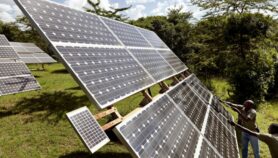By: Catherine Brahic
Send to a friend
The details you provide on this page will not be used to send unsolicited email, and will not be sold to a 3rd party. See privacy policy.
A small increase in temperature could have led to the recent dramatic rise in malaria in the highlands of East Africa, say researchers.
Their study, published online by the Proceedings of the National Academy of Sciences, contradicts previous research that found no increase in temperature in areas where the incidence of malaria was on the rise.
Traditionally, malaria transmission has been limited in the highlands because of their low temperatures, which deter mosquitoes. Researchers have suggested that a rise in global temperatures could reverse this trend.
In 2002 however, Nature published research showing that malaria was on the rise in the highlands of Burundi, Kenya, Rwanda and Uganda but that temperatures there were not rising.
Now, researchers led by Mercedes Pascual of the University of Michigan in the United States have added five extra years of data from the same sites.
Pascual’s team says temperatures there have risen by about 0.5 degrees Celsius since the 1970s.
Using a computer model, they found that this three per cent increase could, in theory, have led to a dramatic 30–100 per cent increase in mosquito numbers in the highlands.
This shows that far from being indifferent to small increases in temperature, mosquito populations appear to respond disproportionately to them, say the researchers.
"Those who argue that we need not worry about small shifts in temperature should pause after considering Pascual’s team’s findings," say Jonathan Patz and Sarah Olson, of the University of Wisconsin, United States, in an accompanying commentary in the journal.
Pascual’s team says that they are not arguing that climate change is the main cause of increased malaria, "but that its role cannot be ruled out on the basis of lack of evidence for temperature warming in these regions".
Link to full paper in Proceedings of the National Academy of Sciences ![]() [1,060KB]
[1,060KB]
Reference: Proceedings of the National Academy of Sciences doi:10.1073/pnas.0508929103 (2006)













